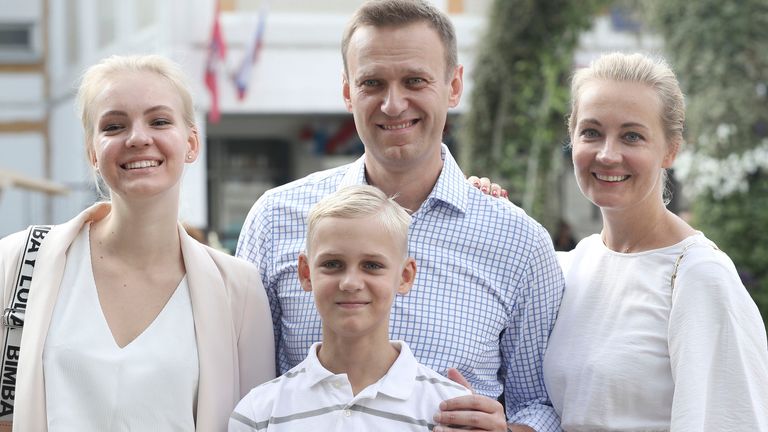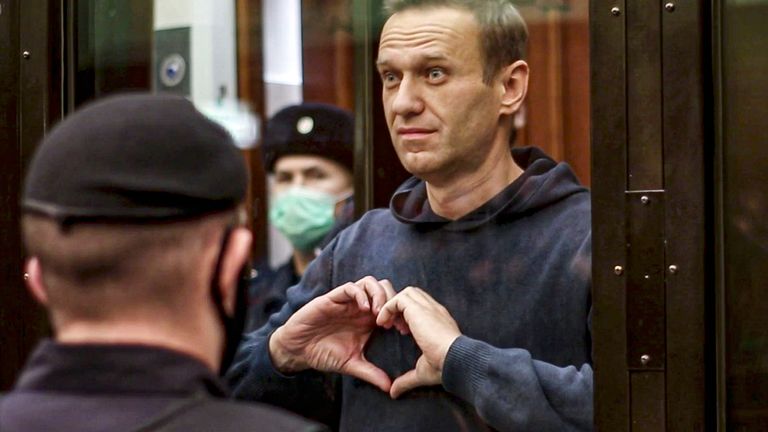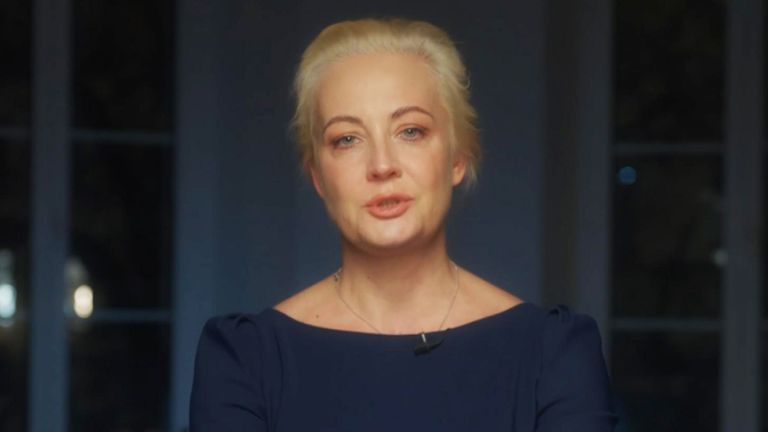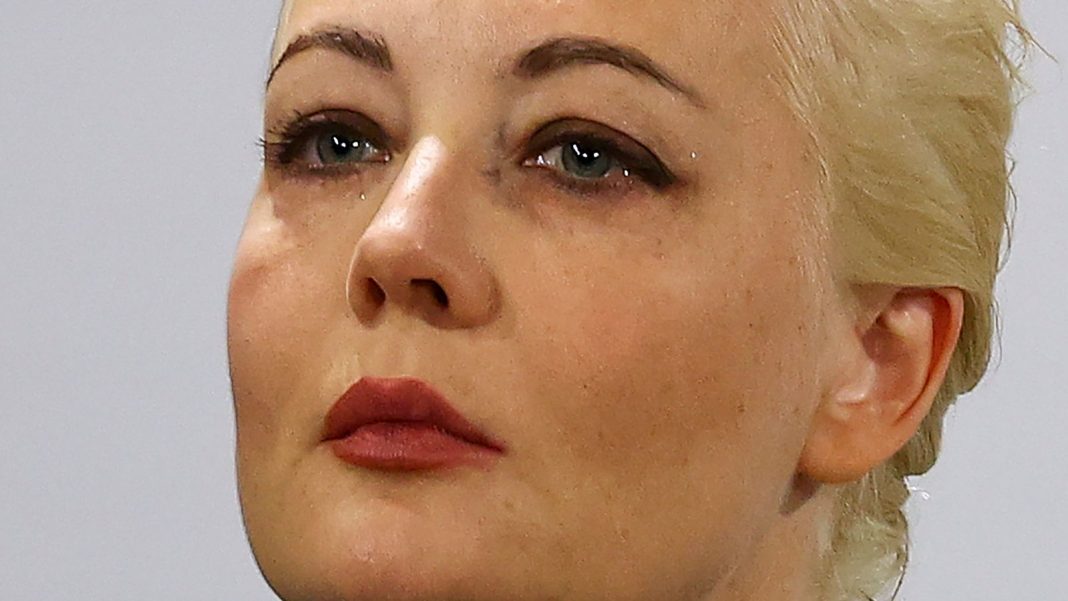Three days after her husband’s death, Alexei Navalny’s widow called on her fellow Russians to “use every opportunity” to fight against Vladimir Putin’s regime.
Having vowed to continue his work, Yulia Navalnaya appears to be preparing to replace her husband as the country’s leading opposition figure.
While he was alive, the 47-year-old mother-of-two stayed largely out of the spotlight. If she fully steps into his shoes, she faces numerous challenges.
The couple at a support rally in Moscow in 2013. Pic: Reuters
Economist who met Navalny on holiday
Born Yulia Borisovna Abrosimova in 1976, she was brought up in Moscow.
Her mother worked for the Ministry of Light Industry, the Soviet government department for consumer goods, and her father, Boris Ambrosimov, was a successful scientist.
She studied economics at the prestigious Plekhanov Russian University of Economics and is thought to have worked as an economist at Moscow Bank.
Mrs Navalnaya met her husband in her early twenties on a holiday in Turkey in 1998.
They married two years later and had their first child, Daria, the following year, and their second, Zakhar, in 2008.

The Navalnys and their two children in Moscow in 2019. Pic: AP
Before forming his own political movement, the couple belonged to Russia’s Yabloko liberal party.
When he launched what was originally the People’s Alliance Party in 2012, Mr Navalny’s wife was often by his side at rallies – and court appearances – as the Kremlin began to arrest him on seemingly spurious charges.
Jan Dollbaum, co-author of the book Navalny: Putin’s Nemesis, Russia’s Future, told Sky News the pair were keen to present her as “a supportive wife but also as an independent, modern person”.
“Typically of any Conservative politician, which Navalny was, the family depicted themselves as happy and harmonious,” he said. “The family came across as relatable and animated by genuine affection for each other.”

Pictured voting for her husband in Moscow in December 2017. Pic: Reuters
In contrast to his high-risk, high-profile political activities, his wife stressed a desire to keep their family life as normal as possible.
“My main task is for our family to stay the same, despite everything,” she once told Harper’s Bazaar.
She remained largely in the background of the Oscar-winning documentary Navalny, with the couple’s children more keenly involved in orchestrating his social media campaigns.

Yulia Navalnaya and Odessa Rae at the Oscars in March 2023. Pic: Reuters
But her dedication to him was always clear. When the film won an Oscar last year, she said in her speech: “My husband is in prison just for telling the truth. My husband is in prison, just for defending democracy.
“I’m dreaming of the day when you will be free and our country will be free. Stay strong, my love.”
His final Instagram post was a Valentine’s Day message to her from prison, which read: “Baby, everything is like a song with you: between us there are thousands of kilometres. But I feel that you are near every second and I love you more and more.”

Alexei Navalny gestures towards his wife in court in 2021. Pic: AP
Credibility in question while still outside Russia
Mrs Navalnaya started to appear in public more after her husband’s poisoning in 2020, Professor Gulnaz Sharafutdinova, director of King’s College London’s Russia Institute, tells Sky News.
But behind bars Mr Navalny continued to operate through his anti-corruption campaign colleagues – and not his wife.
However, those close to them claim she was more involved in the movement than was let on.
Anna Veduta, who works for the US part of Mr Navalny’s foundation, told POLITICO: “There was some kind of telepathic connection between them, they didn’t even need to speak; they thought alike.”
Professor Sharafutdinova describes her as his “ideological comrade”.

Before a court hearing in Pokrov, Vladimir region in February 2022. Pic: Reuters
Within hours of the news he had died, Mrs Navalnaya began her own communications campaign.
There were speeches at the Munich security conference, discussions with EU officials in Brussels, then a video statement, and her own X account was this week briefly suspended and then reinstated.
But with greater prominence has immediately come more intense Kremlin scrutiny, with disinformation circulating about her in Russian state media and online.
Please use Chrome browser for a more accessible video player

2:40
Navalny’s widow speaks out
Tatiana Stanovaya, senior fellow at the Carnegie Russia Eurasia Centre, wrote about the challenges she faces on a thread on X.
First, the fact she is not in Russia and has not announced plans to return, as her husband did, which could bring her credibility into question.
Her equivalent in Belarus, Svetlana Tikhanovskaya, who ran as an opposition candidate when her husband was arrested, “struggled to establish herself as a significant opposition figure in exile”, she adds.
Second, her backing from Western states is unlikely to go down well with most Russians.
“For the Russian audience, a pro-Western stance is frequently perceived as synonymous with betrayal or allying with the enemy, particularly in the war context,” Ms Stanovaya says.
This content is provided by Spreaker, which may be using cookies and other technologies.
To show you this content, we need your permission to use cookies.
You can use the buttons below to amend your preferences to enable Spreaker cookies or to allow those cookies just once.
You can change your settings at any time via the Privacy Options.
Unfortunately we have been unable to verify if you have consented to Spreaker cookies.
To view this content you can use the button below to allow Spreaker cookies for this session only.
Click to subscribe to the Sky News Daily wherever you get your podcasts
And finally, she has to prove herself as politically capable.
Ms Stanovaya wrote on X: “Much will depend on her ability to present herself not just as a widow of a prominent politician but as a formidable, self-accomplished entity.”
She added: “Only time will reveal the extent of her impact on the political landscape.”







